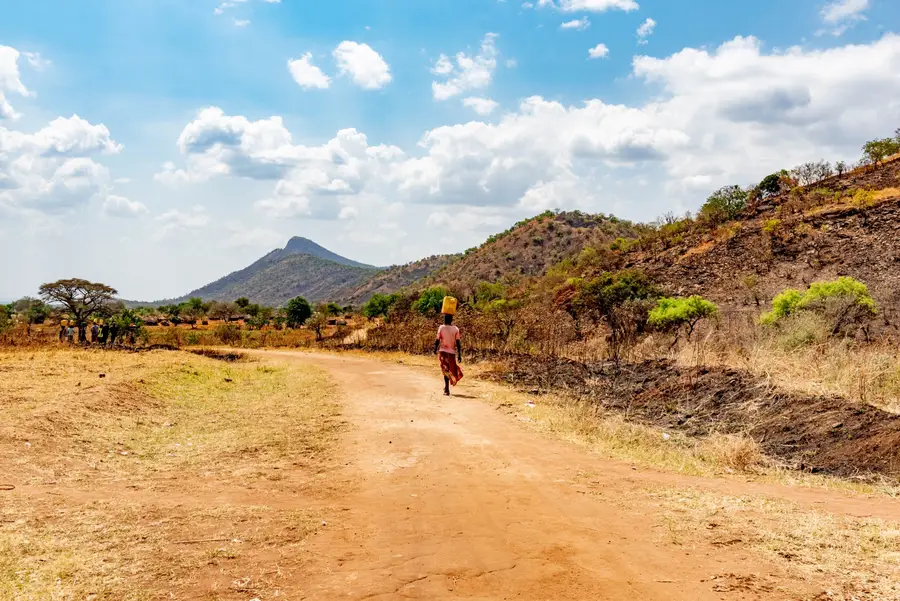
Marian Siljeholm/USAID B4R
The Importance of World Water Day
World Water Day (WWD) is a time of reflection for the global community on access to safe and clean water issues. These issues hit especially close to home for me as I experienced them firsthand growing up in Bogotá, Colombia. As a young girl, I often witnessed my family scrambling to secure buckets of tap water for cooking and washing during water cuts. The water cuts in Bogotá were driven by repairs of aging or malfunctioning infrastructure and often affected various zonal areas in the distribution network that lasted a few hours to a few days depending on the severity of the repair. The magnitude of the challenges my family experienced were relatively minor when compared to other regions in Colombia, such as Las Guajira, that still today struggle to access safe drinking water. Despite Colombia’s vast water resources, a sizeable portion of the population lives under water stress. I wondered why such richness in water resources did not translate into reliable and adequate water access for everyone.
These early experiences fueled my desire to find solutions to persistent global water security issues. My first step in this journey was studying sustainable development and water security at North Carolina State University. Now, as a Senior Project Management Specialist in RTI’s International Development Group, I provide operational and management support to the water, sanitation, and hygiene (WASH) sector. I’ve seen how increased and equitable access to WASH services can transform a community, advancing human health and economic development and building resilience to help communities adapt to climate change.
Each year around WWD, I’m reminded of the water challenges I witnessed firsthand as a child and the ones I now see and work to resolve through RTI programs around the world. Despite the incredible efforts of community and advocacy organizations, researchers, policymakers, and others to find solutions to global water and sanitation challenges, we still have a long road ahead to achieve Sustainable Development Goal (SDG) 6: ensure availability and sustainable management of water and sanitation for all.
The urgency of the global water and sanitation crisis – and hope
This year, in reflecting on the alarming statistics in the recent State of the World’s Water Supply, Sanitation, and Hygiene reports, it is evident that not only is the sanitation and hygiene sector falling behind the water sector, but there is an overall need to accelerate change to solve the water and sanitation crisis. In fact, this is the United Nations’ central focus for WWD this year.
According to the State of the World Reports:
> 0 %
of the world’s population lacks access to safe sanitation services
0 %
of the world’s population lacks access to safely managed drinking water
> 0
million people lack toilets and practice open defecation
The sheer number of people that lack access to safe water and sanitation (4.2 billion) can be paralyzing, and growing threats to water security and sanitation like climate change and rapid population growth, will only exacerbate the problem. While the State of the World reports highlighted challenges, they also offered opportunities in the form of the SDG accelerator framework. This framework offers actionable steps to achieve universal access to water and sanitation.
I found it reassuring that the framework’s five accelerators—governance, financing, capacity development, data and information, and innovation—are part of technical implementation frameworks in the USAID WASH projects I support, particularly for projects that implement a systems-based approach to service delivery. The accelerators function like gears of a machine: All must be present and work together for the machine to work. In the case of WASH, for the system to work properly and effectively, these five accelerators together result in faster and more reliable delivery of WASH services, a critical piece of universal access.
The USAID Nigeria Effective Water for Sanitation, and Hygiene Services (E-WASH) program, which ended last year, provided an example of this systems-based approach in practice. Through E-WASH, RTI supported six State Water Boards (SWBs) responsible for WASH service delivery, helping them transition from the SWBs framework, which depended on highly variable fiscal budgets, to State Water Corporations (SWCs) with greater financial management autonomy, thereby increasing water service delivery to over 225,000 people.
Each of the SDG accelerators played a key role. Governance reforms paved the way for Nigerian SWBs to corporatize and become SWCs. To support their self-sufficiency, these SWCs needed to generate their own financing revenue. Infrastructure enhancements to reduce non-revenue water (e.g., water losses through pipe leaks, illegal connections, unmetered public use, or unbilled water) and increased billing efficiency and customer satisfaction improved financial viability. New infrastructure and corporate structures required capacity building support to ensure the SWCs knew how to budget, plan, and operate new equipment.
E-WASH also helped the SWCs buy new meters, digitize records, and revamp customer databases to track active and potential customers. This data and information helped SWCs determine how best to expand and ensure customer satisfaction, the basis of financial sustainability. An innovative partnership with Coca Cola affiliate NBC Bottling Company provided training and capacity building on best practices for professionalizing water utility operations. E-WASH also implemented a Utility Support Fund to help the SWCs as they transformed which enabled them to receive additional technical and financial support as they reached key milestones.
Ultimately, a systems-based approach, like the SDG accelerator framework, helped Nigeria achieve a great deal in a short time to expand WASH access. This gives me hope that while the challenges for WASH are great, there are solutions.
Reflections on WASH technical excellence
This year’s WWD theme features the tag line of “be the change you want to see in the world,” which encourages individuals to drive and accelerate change from their position in the world. For me, driving change towards universal access to water and sanitation services manifests in supporting my team in identifying and implementing interventions shaped by the learnings below.
As I take the next step in my journey, from WASH project operations to technical implementation, I’ve been reflecting on key takeaways I’ve picked up so far that are important to keep in mind as organizations and partners design and implement WASH projects:
- Remember the magnitude of the numbers of those unreached by WASH as these are not just numbers, but people. For me, this is motivation to focus interventions where they matter most.
- The SDG accelerators manifest themselves in various existing frameworks and strategies; these components must work efficiently together – like gears of a machine – to accelerate results at global, national, and local levels.
- Hygiene means more than just soap and water. We know that when women and girls are given the tools they need to thrive, society benefits. This includes having access to proper menstrual health and hygiene and being in charge of decision-making processes regarding their health.
- The best approaches to market-based sanitation account for customer needs, preferences, and budget or a “best fit product.” Only by allowing for this type of adaptability can we facilitate the adoption of basic sanitation for all.
- What gets measured gets managed. Data collection, monitoring, evaluation, and learning for decision making are crucial to shed light on the global implications of these issues and develop collaborative solutions to address them.
As WWD 2023 reminds us, we all have a role to play in driving change toward universal access to safe water and sanitation for all.
Learn more about our work to improve WASH services.
